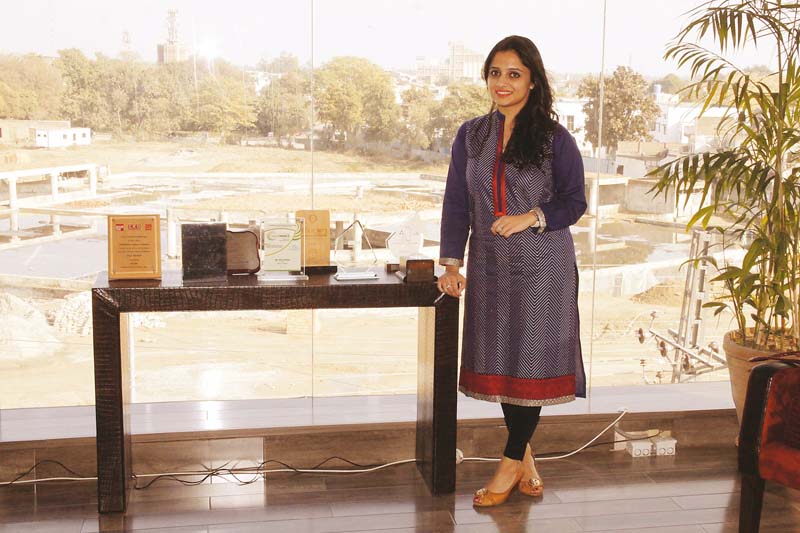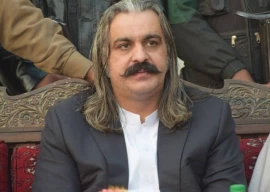

With a graduate degree in economics from the Lahore University of Management Sciences and a masters in entrepreneurship from the Warwick Business School under her belt, Farhan began her career as a consultant and worked for several development institutions. This is also when she first began working on impact investment projects and creating models that would assure multiple gains for all the stakeholders including community members, donors, investors and even the government. In 2008, she met with Asim Buksh, chairman of Buksh Group, and helped co-found Buksh Foundation and Buksh Energy which today is responsible for lighting the lives of millions in Pakistan’s rural areas.

Fiza Farhan at a memorandum of understanding signing ceremony with Jahengir Tareen of Lodhran Pilot Project. PHOTO: LOTUS PR
Farhan has always enjoyed a challenge and it was when Buksh wanted to explore untapped markets that they got involved in development and energy. “In 2009, we saw other microfinance models collapsing around us, so we went about it with a different philosophy — a sustainable one,” she says, explaining why Buksh Foundation was established as a microfinance company. Once the company goals were laid down and its objective clearly established, Farhan set about creating a sustainable enterprise instead of merely cultivating clients. This, in turn, lead to the company’s recorded less than one per cent default rate.
In 2012, Farhan pushed the bar even higher and aimed for a project that would prioritise development in forgotten communities and settled on providing clean energy to villages and settlements that were off the grid. But she does not take complete credit for the idea; Farhan attributes it to Dr Rajendra Pachauri’s Nobel Prize-winning initiative, ‘Lighting a Billion Lives’ in India. The project’s first step involved visiting an off-the-grid village and mobilising the local community. “They need to own the project or else we scrap it,” she explains, adding that previously the government tried to implement the solar energy project in rural areas but failed in several places because the communities living there were completely disinterested. Next, a local female project representative or ‘roshna bibi’ is appointed after due assessment, including several psychological tests, and takes on the role of a change agent. She is given the responsibility to rent out solar-powered lanterns to community members at one-third or half the price of a gas-powered lantern and exchanging used lamps returned every morning with fully-charged ones. As a reward, she gets to pocket half the earnings while the remainder is deposited into an after-sales fund. The foundation also trains two local mechanics who take charge of basic repairs of the solar-powered lamp chargers.
The project has proven to be an all-round success because of its inclusive approach. So far, it has reached out to 140 villages in the country and empowered an equal number of roshna bibis. Even the investors have been kept happy by providing personalised marketing strategies in exchange for funds. Based on unanimous support, this year Farhan also plans on expanding the foundation’s work to tap into biogas, biomass and waste-to-energy projects. “Did you know you can light up the whole of Lahore by simply using the waste it produces?” she exclaims, showcasing just how much further she plans on going.

It is this attitude of excelling and extending benefits to everyone that has become Farhan’s mission in life. Fortunately, she realised her desire to do more than deliver sales pitches from nine to five early in her career. Hence, when Buksh Foundation offered her the opportunity to implement her ideas from scratch, she decided to make the most of it. Like every effective strategist, she calculated the odds of success and made sure to draw out backup plans. “I assure my team that if we don’t manage to execute a plan one way, we’ll try another. If you plan to succeed, you must learn to deal with failure,” she says. This is one of the reasons Farhan has no regrets about the decisions she has made thus far, she claims. “I trust my intuition and take ownership of my decisions.” Neither has she allowed her gender to be an impediment of any kind. “I have sat in countless meetings and conferences as the only woman [in the room], but it does not daunt me,” she says. “Once a woman has proven her competence, there is no stopping her.”
While Farhan has showcased good business sense, she acknowledges that her ascend in the corporate world would have been impossible without the support of her husband and family. Her mentor Abid Bilal and accounts of other successful entrepreneurs also keep her inspired.
Farhan also has a book in the pipeline in which she outlines her philosophy towards life and certain guiding principles that might encourage other women who aspire to enter the male-dominated corporate world. Despite all the feathers in her cap, Farhan remains humble and grounded. “I had no idea there would be so much attention and plaudits coming in from all over the world… Ask my closest friends and they would say Forbes made a mistake.”

Sarah Eleazar is a sub-editor on The Express Tribune’s Lahore desk. She tweets at @SarahEleazar
Published in The Express Tribune, Sunday Magazine, January 25th, 2015.
COMMENTS (2)
Comments are moderated and generally will be posted if they are on-topic and not abusive.
For more information, please see our Comments FAQ



1730797299-0/BeFunky-collage-(21)1730797299-0-165x106.webp)


1730799445-0/Untitled-design-(52)1730799445-0-270x192.webp)
1730800230-0/Copy-of-Untitled-(5)1730800230-0-270x192.webp)







1730706072-0/Copy-of-Untitled-(2)1730706072-0-270x192.webp)
I am so proud of these ladies.
On the one hand you have Pakistani women like this excelling, making a positive difference, on the other you have our crazy mullahs and the hordes of madrassa indoctrinated bigots trying to detroy Pakistan.
It should be mandatory for Madrassa students to learn about women like this in our society and the positive impact they make and how they build apositive image of the country.
More power to our women!